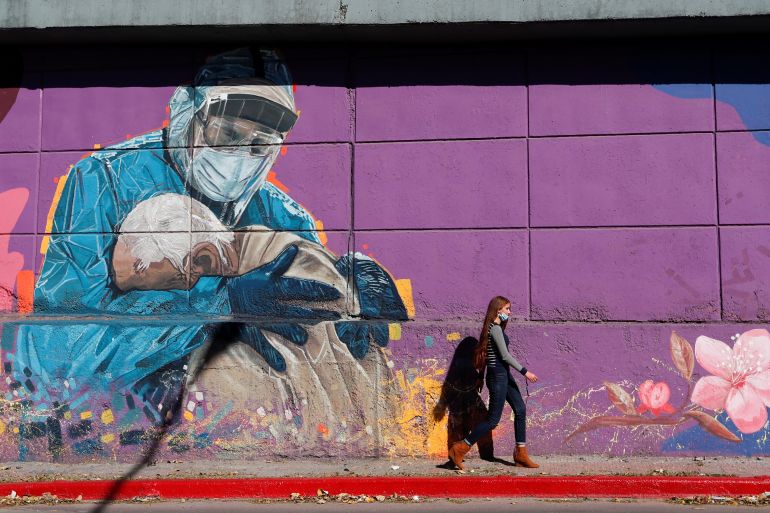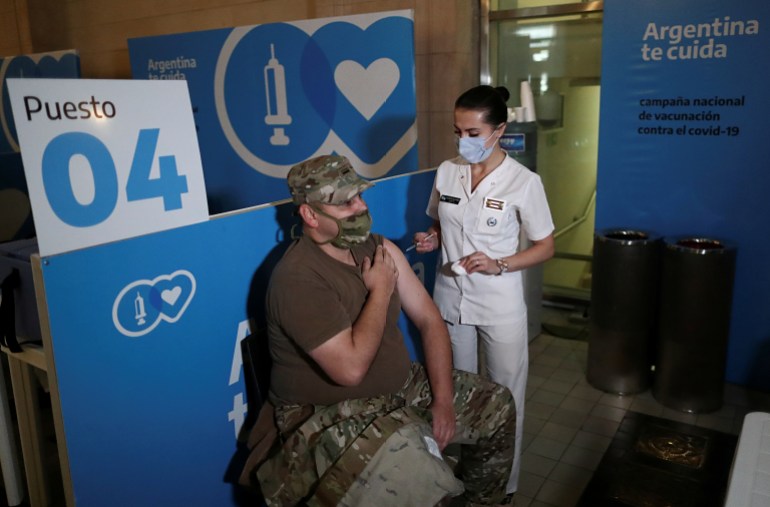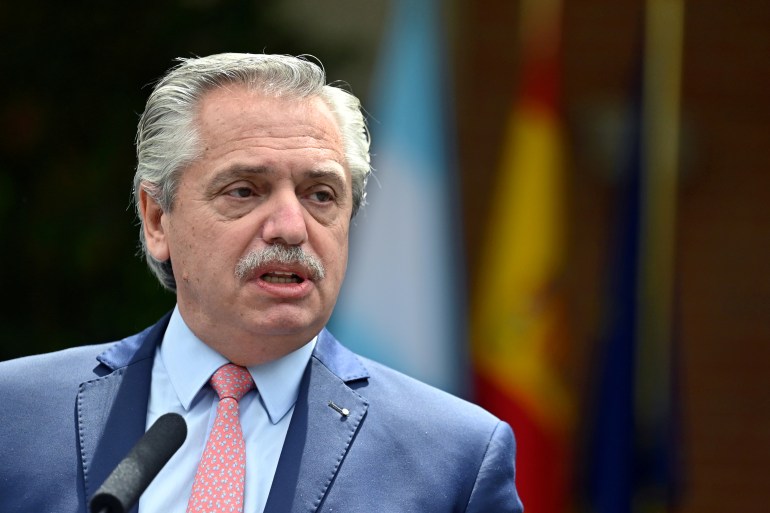Argentina partially reopens after weeks of declining COVID cases
Argentina adopted the plan after 10 consecutive weeks of lower case numbers and eight weeks of decreasing deaths.

Argentina will relax coronavirus restrictions as infection and mortality rates fall, the government announced on Friday, even as the South American nation approached five million cases with more than 107,000 deaths.
The government said its plan includes an increase in the number of people who can meet in person, reopening of schools and an increase in the number of people allowed to enter the country to 1,700 per day from the current 1,000. Argentina has a total population of about 45 million.
Keep reading
list of 3 itemsIn Argentina, COVID jabs propel search for ‘stolen grandchildren’
Copa America 2021 final: It’s Messi v Neymar, Argentina v Brazil
“The more we vaccinate and take care of ourselves, the more we can sustain these achievements and advance in sustained and progressive openings,” President Alberto Fernandez said in a recorded TV message.
Vaccinations have increased in recent days after a surge in virus transmission last month, in the dead of the southern hemisphere winter when more people were tempted to socialise indoors, away from the icy winds coming up from the Antarctic.
Argentina adopted the plan after 10 consecutive weeks of lower case numbers and eight weeks of decreasing deaths.

The second stage of the new programme, depending on infection rates, would include greater capacity for closed-door gatherings, unlimited attendance at open-air events, group trips for those who are fully vaccinated and the reopening of borders to receive vaccinated foreigners.
The programme would eventually include reopening outdoor sporting events. But that will only happen if caseloads continue to fall, Fernandez said.
In news that may convey optimism ahead of November congressional elections, Fernandez said he expects the economy to grow 7 percent this year after a three-year recession severely exacerbated by the pandemic in 2020.
“The vaccine is the best economic policy. Thanks to vaccination we are recovering,” he said.
Given shortages of second doses of Russia’s Sputnik V vaccine, one of the most frequently administered in the country, Argentina has started offering a second dose of the Moderna and/or AstraZeneca vaccines.
Argentina has vaccinated about 25.84 million people with the first dose, but only 7.98 million with the second, according to official data.
In Buenos Aires province alone, 180,000 Argentines are now beyond the mandated three months period between the first and the second doses of Sputnik V but the government is still waiting for further stock of the unique second jab to arrive.
Health Minister Carla Vizzotti told a news conference that “flexibilizing” the kind of vaccines administered would bolster Argentines’ chances against the more contagious Delta variant. First identified in the Latin American country in June, it has so far been detected in 89 cases.
“We are able to begin interchanging different vaccines starting, while we investigate further, with Sputnik V with Moderna and AstraZeneca,” Vizzotti said.

Argentina was one of the first countries to widely use Russia’s Sputnik V COVID-19 vaccine and acted as liaison between the Russian authorities and health authorities in Mexico and Bolivia who signed deals to buy it too.
Last month, Argentina made public a letter it sent to the Russian state entity RDIF which is marketing Sputnik V, saying the country urgently needed second doses and threatening to pull the plug on the entire deal if they were not delivered.
On Thursday, more than 1.5 million doses of Moderna began being rolled out as second jabs around the country, with people above 50 prioritised. Administration of second doses of the AstraZeneca or Moderna vaccines to those who received a first dose of Sputnik in Buenos Aires will begin on Friday.
Moderna’s vaccine, like Pfizer-BioNTech’s, is based on messenger RNA (mRNA) technology, while Sputnik V uses a non-replicative viral vector.
The decision was taken to issue a combination of doses after preliminary results of a trial by Argentinian scientists showed it was safe and offered similar immunity, the government said in a statement.